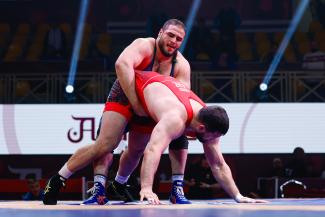Iran Bookends 2018 Cadet World C’Ships with Freestyle and Greco Team Titles
Sunday, July 8, 2018 - 20:57 By Taylor Miller

ZAGREB, Croatia – The 2018 Cadet World Championships wrapped up on Sunday night in Zagreb, Croatia, with five wrestlers crowned Greco World champions and Iran awarded the top team prize in the Greco-Roman discipline.
Iran won the team race, putting up 130 points with four finalists and two Greco World champions. Russia took second with 108 points, and rounding out the top five was Turkey in third with 91 points, Georgia in fourth with 89 points and Uzbekistan in fifth with 83 points.
Iran also won the freestyle team title earlier this week.
It was an action-packed title bout at 45 kg as two-time World finalist Hennadii ZAVERTAILO (UKR) took on Cadet European bronze medalist Ilias IANDAROV (RUS).
Iandarov held a 2-0 lead at the break, but the two went back and forth, trading leads in the second period. Eventually Iandarov took down the 2017 Cadet World silver medalist and rattled off three gut wrenches for a technical fall win, 17-7.
At 51 kg, this year’s two Asian bronze medalists went head-to-head for World gold.
Lazizkhon UZBEKOV (UZB) struck first against Laishram MEITEI (IND) and held onto the lead throughout the bout. The Uzbek used two sets of exposure to win the World title at 51 kg, 6-2.
In the final at 60 kg, points were only scored on passivities, cautions and failed challenges as Serhat KIRIK (TUR), who finished fifth at the European Championships, knocked off Asian silver medalist Shahin BADAGHI MOFRAD (IRI), 4-1.
At 71 kg, Alexandrin GUTU (MDA) became only the second Cadet Greco-Roman World champion for Moldova on Sunday night when he defeated Asian champion Shu YAMADA (JPN) with a dominant 12-2 technical fall.
Gutu, who won silver at 2018 Euros, drew first blood with a duck under for a takedown, followed by a correct throw. Gutu took his momentum and a 6-2 lead into the second period. There, he extended his lead with a throw by and finished off the bout with a big lift for four points to end the match in a tech fall.
The winner at 92 kg was determined in the final 20 seconds of the match.
Aleksei MILESHIN (RUS) held a 3-0 advantage at the break over Asian champion Mohammad NOSRATI (IRI), thanks to a correct throw he executed after Nosrati was put down in par terre.
In the second period, Nosrati got a chance on top after a Mileshin passivity call. With only 20 seconds left, the Iranian scored on a gut wrench and held the Russian off for a 3-3 win on criteria and the gold medal.
That bout concluded the 2018 Cadet World Championships.
Team standings
1. Iran - 130
2. Russia - 108
3. Turkey - 91
4. Georgia - 89
5. Uzbekistan - 83
6. Azerbaijan - 79
7. Kazakhstan - 62
8. India - 57
9. Armenia - 55
10. Ukraine - 48
Finals results
45 kg
GOLD - Ilias IANDAROV (RUS)
SILVER - Hennadii ZAVERTAILO (UKR)
BRONZE - Edmond NAZARYAN (BUL)
BRONZE – Gurban GURBANOV (AZE)
1st - Ilias Iandarov (Russia) TF Hennadii Zavertailo (Ukraine), 17-7
3rd - Edmond Nazaryan (Bulgaria) dec. Amirreza Dehbozorgi (Iran), 2-0
3rd - Gurban Gurbanov (Azerbaijan) dec. Mizuki Araki (Japan), 2-0
51 kg
GOLD - Lazizkhon UZBEKOV (UZB)
SILVER - Laishram MEITEI (IND)
BRONZE - Hasrat JAFAROV (AZE)
BRONZE – Merey MAULITKANOV (KAZ)
1st - Lazizkhon Uzbekov (Uzbekistan) dec. Laishram Sayon Meitei (India), 6-2
3rd - Hasrat Jafarov (Azerbaijan) dec. Robert Karapetyan (Armenia), 4-2
3rd - Merey Maulitkanov (Kazakhstan) dec. Baktiiar Akberdiev (Kyrgyzstan), 2-1
60 kg
GOLD - Serhat KIRIK (TUR)
SILVER - Shahin BADAGHI MOFRAD (IRI)
BRONZE - Adam HAJIZADA (AZE)
BRONZE – Gagik SNJOYAN (FRA)
1st - Serhat Kirik (Turkey) dec. Shahin Badaghi Mofrad (Iran), 4-1
3rd - Adam Hajizada (Azerbaijan) dec. Pravesh Pravesh (India), 6-3
s3rd - Gagik Snjoyan (France) dec. Vladyslav Yevtushenko (Ukraine), 6-4
71 kg
GOLD - Alexandrin GUTU (MDA)
SILVER - Shu YAMADA (JPN)
BRONZE - Veisal EYUBOV (KAZ)
BRONZE – Giorgi SHPETISHVILI (GEO)
1st - Alexandrin Gutu (Moldova) TF Shu Yamada (Japan), 12-2
3rd - Veisal Eyubov (Kazakhstan) dec. Petar Gornyashki (Bulgaria), 5-0
3rd - Giorgi Shpetishvili (Georgia) TF Abdullah Ates (Turkey), 13-2
92 kg
GOLD - Mohammad NOSRATI (IRI)
SILVER - Aleksei MILESHIN (RUS)
BRONZE – Jacob KAMINSKI (USA)
BRONZE – Osman AYAYDIN (TUR)
1st - Mohammad Nosrati (Iran) dec. Aleksei Mileshin (Russia), 3-3
3rd - Jacob Kaminski (United States) TF Richard Karelson (Estonia), 9-1
3rd - Osman Ayaydin (Turkey) TF Lasha Tvildiani (Georgia), 9-0


Share your thoughts.
Comments